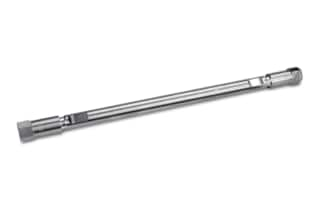
|
Chemistry |
C18 |
|
Separation Mode |
Reversed Phase |
|
Particle Substrate |
Silica |
|
pH Range Min |
3 pH |
|
pH Range Max |
7 pH |
|
Maximum Pressure |
6000 psi (415 Bar) |
|
Endcapped |
Yes |
|
Bonding Technology |
dC18 |
|
Silanol Activity |
Medium |
|
Particle Shape |
Spherical |
|
Particle Size |
5 µm |
|
Endfitting Type |
Waters |
|
Pore Size |
100 Å |
|
Format |
Column |
|
BTO Flag |
true |
|
Surface Area |
330 |
|
System |
HPLC |
|
USP Classification |
L1 |
|
Inner Diameter |
3 mm |
|
Length |
150 mm |
|
Carbon Load |
12 % |
|
UNSPSC |
41115709 |
|
Brand |
Atlantis |
|
Product Type |
Columns |
|
Units per Package |
1 pk |

Atlantis dC18 Column, 100Å, 5 µm, 3 mm X 150 mm, 1/pk
Atlantis dC18 columns are universal reversed-phase C18 columns made of silica that are used for polar compound retention. The di-functionally bound C18 ligands in the Atlantis dC18 columns have been improved for usage with extremely watery mobile phases, including 100% water. The Atlantis dC18 analytical column is a universal C18 column that is fully compatible with LC/MS. In comparison to traditional reversed-phase HPLC columns, it has been engineered to achieve an appropriate balance of retention for polar and nonpolar chemicals while demonstrating excessive retention of hydrophobic compounds.
The Atlantis dC18 Column is compatible with aqueous mobile phases and has improved pH stability. This equipment's silica-based, di-functionally linked C18 packing material allows retention and separation of polar, water-soluble chemicals, making it a perfect piece of lab equipment for reversed-phase HPLC.
The Atlantis dC18 Column combines optimized stationary phase characteristics such as end-capping, silica pore size, ligand type, and bonded phase ligand density to give superior peak form, low pH stability, improved polar compound retention, and resistance to hydrophobic collapse (dewetting). The Atlantis dC18 Column is one of the best reversed-phase HPLC columns for polar compound separation as well as typical reversed-phase applications. The di-functional silane bonding chemistry used in the Atlantis dC18 column provides good stability under acidic mobile conditions, as well as a longer column lifetime and low pH stability.
The right lab equipment can significantly boost your productivity. To learn more about the Atlantis dC18 Column variants or to find more goods that operate with it, visit our website to shop for lab equipment; you may browse through our website, refer to our catalog, and guarantee your lab needs are covered as needed.
You might also want to look into the Atlantis Silica dC18 VanGuard Cartridge, 100Å, 5 µm, 2.1 mm X 5 mm, 3/pk, which is designed to protect your Atlantis dC18 Column analytical column by preventing any chemical or particle impurities from staying in the mobile phase. This results in your column giving exceptional performance over an extended length of time, as well as requiring you to change the lab equipment less frequently.
What Is The Maximum Pressure The Atlantis dC18 Column Can Operate Up To?
The Atlantis dC18 Column can tolerate operating pressures up to 6000 psi or (415 Bar) and a pH range of 3 to 7; however, you should note that working at the extremes of pressures, pH, and/or temperatures will result in shorter column lifetimes.